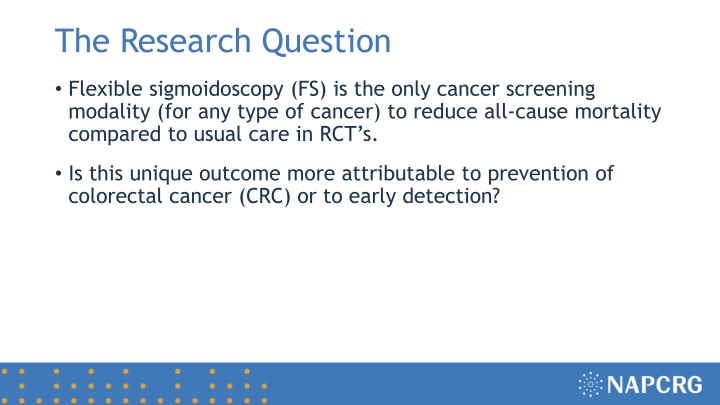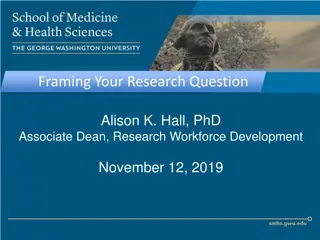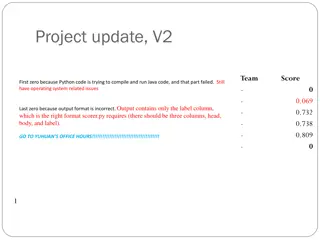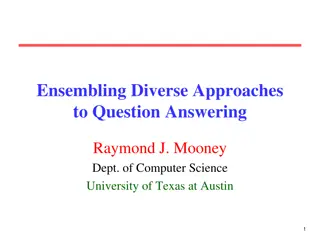The Research Question
Study evaluates the impact of flexible sigmoidoscopy (FS) on all-cause mortality and colorectal cancer (CRC) outcomes compared to usual care. Findings suggest CRC prevention, rather than early detection, drives mortality reduction. Clinical practice implications and uncertainties about other screening modalities are discussed.
Download Presentation

Please find below an Image/Link to download the presentation.
The content on the website is provided AS IS for your information and personal use only. It may not be sold, licensed, or shared on other websites without obtaining consent from the author.If you encounter any issues during the download, it is possible that the publisher has removed the file from their server.
You are allowed to download the files provided on this website for personal or commercial use, subject to the condition that they are used lawfully. All files are the property of their respective owners.
The content on the website is provided AS IS for your information and personal use only. It may not be sold, licensed, or shared on other websites without obtaining consent from the author.
E N D
Presentation Transcript
The Research Question Flexible sigmoidoscopy (FS) is the only cancer screening modality (for any type of cancer) to reduce all-cause mortality compared to usual care in RCT s. Is this unique outcome more attributable to prevention of colorectal cancer (CRC) or to early detection?
Research Design and Method Study selection: RCT s selected by the U.S. Preventive Services Task Force 2016 Evidence Review for Colorectal Cancer Screening Intention-to-screen, random-effects, meta-analysis of: All-cause mortality CRC incidence CRC mortality Regression analysis of: CRC incidence versus all-cause mortality CRC incidence versus CRC mortality CRC mortality versus all-cause mortality
What the Research Found RCT s of FS and fecal occult blood test (FOBT) have randomized 786,769 persons (FS = 5 trials, 458,002 persons; FOBT = 5 trials, 328,767 persons). FS consistently reduced all-cause mortality (RR = 0.975, 95%CI 0.958 0.992, p = 0.004, I2= 0%) and consistently prevented CRC (RR = 0.79, 95%CI 0.74 0.84, p < 0.001, I2= 0%). FOBT did not reduce all-cause mortality (RR = 1.001, 95%CI 0.992 1.010, p = 0.83, I2 = 0%) nor prevent CRC (RR = 0.96, 95%CI 0.89 1.02, p = 0.20, I2= 56%). The FS trials display a strong, linear, dose-response relationship (r2= 0.90, P=0.013) between the amount of CRC prevention and the amount of all-cause mortality reduction. CRC prevention accounts for the entire all-cause mortality reduction, implying that early detection of CRC had little or no effect upon the risk of dying.
What this means for Clinical Practice CRC prevention and death (i.e. all-cause mortality) reduction should be the primary goals of colorectal screening. CRC prevention and death reduction are patient-oriented outcomes by themselves, whereas early detection of cancer and reduction of a specific type of death are disease-oriented outcomes if they do not translate into fewer deaths. At present, flexible sigmoidoscopy is the only colorectal screening modality with RCT evidence of CRC prevention or death reduction. Given that FOBT failed to achieve these outcomes in similar RCT s, it is unclear if fecal immunochemical test (FIT) or other stool tests should be expected to do so.
Citation Swartz AW, Eberth JM, Strayer SM. Preventing colorectal cancer or early diagnosis: Which is best? A re-analysis of the U.S. Preventive Services Task Force Evidence Report. Prev Med. 2019 Jan;118:104-112. doi: 10.1016/j.ypmed.2018.10.014. https://doi.org/10.1016/j.ypmed.2018.10.014 iPhone: open camera and point it at QR code Android: open QR app and point camera at QR code























